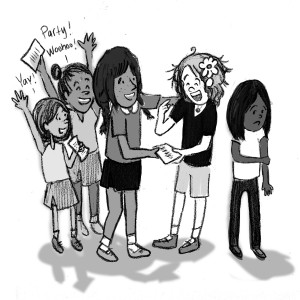|
|
September 26, 2013
Got an email from Concerned Mom whose smart, funny daughter has no trouble making friends, but lots of trouble keeping them. The pattern is this: Daughter gets close to other girls and feels accepted by them. Then, within weeks new found friends exclude and then ignore the girl. Naturally, she feels upset and alone, which, of course breaks Mom’s heart. She turned to me for advice and here’s what I told her:
I understand that it breaks your heart to see your daughter so unhappy. Of course you want her to make real friends who treat her with affection, kindness and respect. But it feels like something is missing in your email.
Each time your daughter is disappointed by a new friend you’ve listened to her side of the story, sympathized and offered comfort and support. All good! But there are at least two sides to every relationship story. That’s why I am curious about what’s going on from the other girls’ perspectives. Maybe you’re also wondering why each of these new friends turn against your daughter after such a short time? It’s a mystery worth exploring.
What might your daughter be doing (knowingly or unknowingly) to contribute to this reaction she often gets? How about if you ask her: “Why do you think ____ stopped wanting to be your friend?”
This question may bring up a lot of emotion, so please ask it in a neutral tone of voice. You’re not accusing your daughter of anything! You’re simply inviting her to put aside her sadness and think about what may be going on here. Right now, she’s hurt and confused and probably feeling powerless. She can regain some of her power by understanding how she functions in friendships because she plays a significant role in every one of them, whether she’s aware of it yet or not. To encourage her to think about that role you need to ask thoughtful, open-ended questions that have no “right” or “wrong” answers. Questions like “Why do you think this girl stopped being your friend?”
Listen to your daughter with an open heart and mind. Try not to interrupt. Initially, she may not say much. She might just shrug and say, “I don’t know.” In which case you might nod understandingly and say, “It’s hard to know why other people do what they do. But we usually have a reason. Your friends have been rude to you. If you could just guess why, what would you guess?”
Your daughter may have fallen into the habit of thinking of herself as a powerless victim to whom other people do unkind things. That’s not a good mental place for her to be. We want our girls to understand emotions (their own and other people’s). We also want them to feel confident in their ability to make and keep real friends. That includes learning to rebound from set-backs and to negotiate the ups and downs of relationships.
I hope this helps.
In friendship,
Annie
*Illustration by Erica De Chavez, from my upcoming The Girls Q&A Book on Friendship
UPDATE October 3, 2014: The Girls Q&A Book on Friendship: 50 Ways to Fix a Friendship Without the DRAMA is now available in print and on Kindle (the ebook can be read on any device, your mobile phone, tablet, or computer with the free Kindle reader app). Visit GirlsQandA.com for an excerpt, reviews, and to order your copy.

September 23, 2013
A friend just informed me that her 14-year-old granddaughter, Samantha, was approached by a few classmates on the first day of school and told, “Everyone hates you, Samantha. You know that, don’t you?”
Apparently Sami was clueless, so the news understandably did her in for the rest of the day. She wasn’t too keen on going to school the next morning, either.
We know kids are kids and they often need our help. So what’s our usual helpful advice in these situations?
A) Ignore those mean girls.
B) Pretend it doesn’t bother you.
C) Give them a taste of their own bitchiness right back at them.
D) Diffuse the tension with humor.
E) If the harassment gets really bad, switch schools.
F) None of the above.
F is the answer, even though most well-meaning adults believe the remedy to bullying is in the hand’s of the victim. (See A-E) Apparently we’re not trying to change the abuser’s behavior… only the victim’s response! Does anyone but me see how crazy that is?
 I'm gonna do what I want and you can't stop me! Think about it this way: If a preschooler brought a baseball bat to school and started beating other kids over the head, teachers would disarm the abuser in a hot New York minute. They wouldn’t waste a second telling the victims to “ignore” the abuse. They’d shut-down the bat-wielder. Then they’d bring in BatKid’s parents and work together to educate that child and help him or her become a caring and responsible member of the school community. That’s the appropriate and effective way to help the victims and the aggressive child as well.
So what’s in the way of taking the same direct, common sense preschool approach to mean-kid behavior in middle and high schools? Can someone please tell me because I’ve been working on this stuff for over 30 years and I still don’t get why the solution eludes us.

September 16, 2013
 Growing up as a Jewish girl, of course I knew about Anne Frank’s diary. I read it for the first time when I was in the 4th grade. When my parents gave me a diary for Chanukkah that year, it made sense that I should call my diary Kit (a thinly veiled homage to Anne’s journal, Kitty). Growing up as a Jewish girl, of course I knew about Anne Frank’s diary. I read it for the first time when I was in the 4th grade. When my parents gave me a diary for Chanukkah that year, it made sense that I should call my diary Kit (a thinly veiled homage to Anne’s journal, Kitty).
I re-read Anne’s diary in high school and was cast in the role of Anne in my high school drama class’ reading of the play. I’ve white-knuckled and bawled through the 1959 film version of The Diary of Anne Frank several times. I’ve read numerous biographies of Anne Frank as well as, Anne Frank Remembered, the astonishing memoir by Meip Gies, one of the Frank family’s protectors.
When I had an opportunity to visit Amsterdam for the first time, David and the kids and I made the pilgrimage to the Anne Frank House.
With all that I knew or thought I knew, I had no idea Anne Frank wrote fiction. Last week, when I discovered that was the case, I ran out and borrowed our library’s copy of Anne Frank’s Tales of the Secret Annex: A collection of her short stories, fables, and lesser-known writings.
Some of the writing is very strong and some is on the level you’d expect from a 13 or 14 year old, which is what she was when she wrote it. But obviously Anne Frank had a literary gift. Part of it was a natural way with words and a clear confidence in her ability to express herself creatively. Another part was her deep insight into human emotions and behavior.
For example, in her story “Eva’s Dream” (1943) Anne writes of the complex inner workings of girls’ friendships. In the story, Elf (a wise being), helps the young Eva understand why one of her classmates, the beautiful, wealthy (mean girl) Leentje, wields such power over the rest of them. Even more impressive, Anne Frank explains (through Elf) how social courage and compassion can transform malice into camaraderie.
Elf enlightens Eva in this passage: “If (Marie) were to stand up to her, Leentje would soon have all the other girls on her side. She’d point out that Marie is ugly and poor. The rest of you would do whatever Leentje tells you to because you know she’ll be mad at you if you don’t, and that you’ll never be able to get in her good graces again. And in your eyes, being out of your ringleader’s good graces is almost as bad as having the principal mad at you. You wouldn’t be allowed to go to her house anymore, and the rest of the class would ignore you. Later on, girls like Leentje will find themselves alone, because when the other girls are older they’ll turn against her. But Eva, if you were to do that now, Leentje would have an oportunity to change before she winds up being alone for the rest of her life.”
“Should I try to get the other girls to stop listening to her?” Eva asked.
“Yes. She’ll be angry and indignant at first. But once she realizes why you’re doing it and understands her own behavior better, she’ll be grateful and will have more genuine frineds than she’s ever had before.”
Seventy years later, this online teen adviser couldn’t have said it better.

September 15, 2013
 Another make-shift memorial mourns another bullying victim Another kid pushed to the edge by bullies. Another disheartened sheriff addresses a news conference. “(She) was absolutely terrorized on social media.” Another disbelieving mom tries making sense of life without her little girl. “I never, ever thought it would happen to me or my daughter.”
This tragedy happened in Florida, though it could have been any place. Fitting, since the internet isn’t really any place but, at the same time, it’s every place. This case of peer abuse picked up fuel on ask.fm before it exploded Monday inside a 12 year’s mind, with the thought her life was worthless. Do ask.fm and other social media sites have any responsibility for the vicious behavior of its users? Yes. Because it happened on their turf. Could they do more to make their sites “safer.” Absolutely. Kids haven’t yet learned to manage their destructive emotions. They flip out of control frequently. That’s why adults monitor what goes on during school recess. Someone has to keep the peace because kids can’t do it themselves. Is it a perfect system? No, but it helps.
Social media is the largest unsupervised playground, yet where are the monitors? If anyone 15 years ago thought that kids online would naturally treat each other with respect, he’s surely woken up by now. We’re all awake now, aren’t we?
Social media sites need human moderation. That won’t completely solve the problem of bullying, but it will help to lessen it. Parents, find out which sites your kids frequent and what level of moderation (if any) those companies use. Bottom line: Your kids should not be on social media sites that don’t have human moderation in real time. Anything less puts your child at an unacceptable level of risk. Take away your business and see if that gets them to clean up their act.
Pressuring social media sites to take responsibility for the well-being of their tween and teen users, is an essential step. We also have to do our part, as parents and teachers. Our children seriously need an education at home and at school. Kids are so vulnerable to peer approval addiction, their thinking about right and wrong can get totally warped in the moment. Parents, kids, teachers, school administrators, counselors, coaches, youth leaders, mentors, all of us need to do more to reel in the culture of cruelty. Every day in which we react to a tragedy with a make-shift memorial, instead of the daily work of building schools and communities of compassion and respect, is a day we’ve failed our kids.
 — Older Posts »
| |















